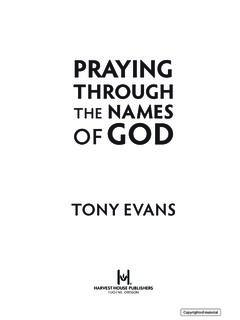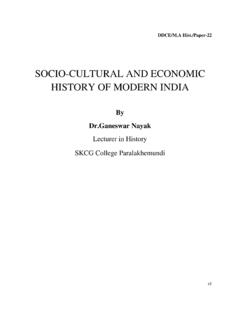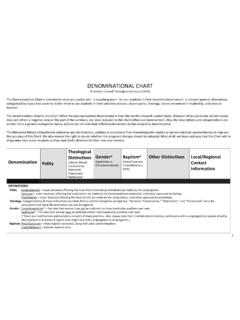Transcription of The Complete Guide to Christian Denominations
1 Complete Guide to Christian 111/18/14 9:12 AMCopyrighted material Unless otherwise indicated, all Scripture quotations are taken from the HOLY BIBLE, NEW INTERNATIONAL VERSION , NIV . Copyright 1973, 1978, 1984 by the International Bible Society. Used by permission of Zondervan. All rights marked nkjv are taken from the New King James Version . Copyright 1982 by Thomas Nelson, Inc. Used by permission. All rights marked nasb are taken from the New American Standard Bible , 1960, 1962, 1963, 1968, 1971, 1972, 1973, 1975, 1977, 1995 by The Lockman Foundation. Used by permission. ( )All italicized emphasis in Scripture quotations is added by the by Dugan Design Group, Minneapolis, Minnesota Cover illustration @ Michael Brown / FotoliaTHE Complete Guide TO Christian Denominations Copyright 2005/2015 Ron Rhodes Published by Harvest House Publishers Eugene, Oregon 97402 978-0-7369-5291-0 (pbk.) ISBN 978-0-7369-5292-7 (eBook)The Library of Congress has cataloged the edition as follows: Rhodes, Ron.
2 The Complete Guide to Christian Denominations / Ron Rhodes. p. cm. Includes bibliographical references and index. ISBN 0-7369-1289-4 (pbk.) 1. Protestant churches United States. 2. Protestant churches Doctrines. I. Title. 2005 280'.4 dc22 2004017507 All rights reserved. No part of this publication may be reproduced, stored in a retrieval sys-tem, or transmitted in any form or by any means electronic, mechanical, digital, photocopy, recording, or any other except for brief quotations in printed reviews, without the prior per-mission of the in the United States of America15 16 17 18 19 20 21 22 23 / VP-CD / 10 9 8 7 6 5 4 3 2 1 Complete Guide to Christian 211/18/14 9:12 AMCopyrighted material In honor of the head of the church (Ephesians 5:23),who purchased the church with His own blood (Acts 20:28) Jesus ChristComplete Guide to Christian 311/14/14 1:43 PMCopyrighted material AcknowledgmentsResearching every denomination in this book required consid-erable effort.
3 Representatives of many of these Denominations made the task easier by pointing me to helpful information regarding their groups. To these individuals too many to list I offer a heartfelt , David, and Kylie (my wife and adult children) as always, I could not have written this book without your con-tinued support. God has used you mightily in my life! Complete Guide to Christian 411/14/14 1:43 PMCopyrighted material CONTENTSB eginnings: The Emergence of Christianity and Denominations .. 71. Adventist Churches .. 232. Baptist Churches .. 393. Brethren Churches .. 814. Catholic Churches .. 1075. Christian Churches .. 1256. Congregational Churches .. 1397. Episcopal and Anglican Churches .. 1518. Friends (Quaker) Churches .. 1719. Fundamentalist, Bible, and Conservative Evangelical Churches .. 18510. Holiness Churches .. 20911. Lutheran Churches .. 22912. Mennonite Churches .. 25913. Methodist Churches .. 28514. Orthodox Churches .. 31315. Pentecostal Churches.
4 33316. Presbyterian Churches .. 36917. Reformed Churches .. 395 Postscript: Unity in Diversity .. 407 Appendix A: Website Addresses of Additional Denominations of Interest .. 411 Appendix B: Cults Are Not Denominations .. 417 Notes .. 423 Bibliography .. 425 Index of Denominations .. 429 Index of Persons .. 435 Chart 439 Complete Guide to Christian 511/14/14 1:43 PMCopyrighted material Complete Guide to Christian 611/14/14 1:43 PMCopyrighted material 7 BEGINNINGS: THE EMERGENCE OF CHRISTIANITY AND DENOMINATIONSThe word Christian is used only three times in the New Tes-tament, most importantly in Acts 11:26 (see also Acts 26:28 and 1 Peter 4:16). In Acts 11:26, we are told simply and straightfor-wardly, The disciples were called Christians first at Antioch. This would have happened around AD 42, about a decade after Christ died on the cross and rose from the this time, the followers of Jesus referred to themselves as brothers (Acts 15:1,23), disciples (Acts 9:26), believers (Acts 5:12), and saints (Romans 8:27).
5 Now, in Antioch, they were called term is loaded with significance. Among the ancients, the ian (or ean) ending meant belonging to the party of. Herodians belonged to the party of Herod. Caesareans belonged to the party of Caesar. Christians belonged to Christ. And Christians were loyal to Christ, just as the Herodians were loyal to Herod and Cae-sareans were loyal to Caesar (see Mark 3:6; 12:13).The name Christian is noteworthy because these followers of Complete Guide to Christian 711/14/14 1:43 PMCopyrighted material The Complete Guide to Christian Denominations8 Jesus were recognized as members of a separate group. They were distinct from Judaism and from all other religions of the ancient world. We might loosely translate the term Christian , those belonging to Christ, Christ-ones, or perhaps Christ-people. They are ones who follow the who have studied the culture of Antioch have noted that the Antiochians were well-known for making fun of people.
6 They may have used the word Christian as a term of derision, an appel-lation of ridicule. Nevertheless, history reveals that by the second century, Christians adopted the title as a badge of honor. They took pride (in a healthy way) in following Jesus. They had a genu-ine relationship with the living, resurrected Christ, and they were utterly faithful to Him, even in the face of death. The city of Antioch was a mixture of Jews and Gentiles. People of both backgrounds in this city became followers of Jesus. What brought these believers unity was not their race, culture, or lan-guage. Rather, their unity was rooted in the personal relationship each of them had with Jesus. Christianity crosses all cultural and ethnic a Christian is one who has a personal relationship with Jesus Christ, then Christianity is a movement of people who have per-sonal relationships with Jesus Christ. This may sound simplistic, but from a biblical perspective, this is the proper starting the New Testament, the early Christians never referred to their collective movement as Christianity, even though they used the term Christian with greater frequency as the movement grew in numbers.
7 By the time of Augustine (AD 354 430), the term Christianity appears to have become a widespread appellation for the Christian Birth of the ChurchScripture refers to both the universal church and the local Complete Guide to Christian 811/14/14 1:43 PMCopyrighted material Beginnings: The Emergence of Christianity and Denominations9church. The universal church is a company of people who have one Lord and who share together in one gift of salvation in the Lord Jesus Christ (Titus 1:4; Jude 3). It may be defined as the ever enlarging body of born-again believers who comprise the univer-sal body of Christ, over which He reigns as the members of the church and members of differ-ent Denominations may differ in age, sex, race, wealth, social sta-tus, and ability, true believers are all joined together as one people (Galatians 3:28). All of them share in one Spirit and worship one Lord (Ephesians 4:3-6). This body is comprised only of believers in Christ. The way one becomes a member of this universal body is to simply place faith in Christ.
8 If you re a believer, you re in!The word church is translated from the Greek word ekkle-sia. This Greek word comes from two smaller words. The first is ek, which means out from among. The second is klesia, which means to call. Combining the two words, ekklesia means to call out from among. The church represents those whom God has called out from among the world and from all walks of life. All are welcome in Christ s theologians believe the church did not exist in Old Tes-tament times (I think they are right). Matthew 16:18 cites Jesus as saying, I will build my church (future tense). This indicates that when He spoke these words, the church did not yet exist. This is consistent with the Old Testament, which includes no reference to the church. In the New Testament, the church is portrayed as distinct from Israel in such passages as Romans 9:6, 1 Corinthians 10:32, and Hebrews 12:22-24. Therefore, we should not equate the church with believing Israelites in Old Testament indicates that the universal church was born on the Day of Pentecost (see Acts 2; compare with 1:5; 11:15; 1 Corin-thians 12:13).
9 We are told in Ephesians 1:19-20 that the church is built on the foundation of Christ s resurrection, meaning that the Complete Guide to Christian 911/14/14 1:43 PMCopyrighted material The Complete Guide to Christian Denominations10church could not have existed in Old Testament times. The church is thus called a new man in Ephesians 2 one universal church is represented by many local churches scattered throughout the world. For example, we read of a local church in Corinth (1 Corinthians 1:2), and another in Thessa-lonica (1 Thessalonians 1:1). Only a few local churches existed at first, but due to the missionary efforts of the early Christians, churches soon cropped up around the Facts on the ChurchUniversal ChurchLocal Churchmembershipembraces all believ-ers from Pentecost to the raptureembraces believ-ers in a specific locale who meet for fellowship and worshipliving or deadincludes living and dead believersincludes living believers onlydenominational affiliationincludes all true believers, regardless of denominational affiliationnormally identi-fied with a specific denomination or movementjoiningOne becomes a member by faith in becomes a member by pro-fession of faith in Christ plus any requirements unique to the denomination, such as Guide to Christian 1011/14/14 1:43 PMCopyrighted material Beginnings: The Emergence of Christianity and Denominations11 The New Testament strongly urges believers to attend local churches.
10 Hebrews 10:25 specifically instructs us not to for-sake meeting together. The Christian life as described in Scrip-ture is to be lived in the context of the family of God and not in isolation (Acts 2; Ephesians 3:14-15). Moreover, by attending church, we become equipped for the work of ministry (Ephesians 4:12-16). The Bible knows nothing of a lone ranger Christian . As the old proverb says, many logs grouped together burn brightly, but embers that are isolated quickly die out (see Ephesians 2:19; 1 Thessalonians 5:10-11; and 1 Peter 3:8).The Spread of ChristianityChristianity experienced phenomenal growth following the death and resurrection of Jesus Christ. We learn in Acts 1:15 that about 120 Jewish believers in Christ gathered in Jerusalem. A bit later, after Peter s powerful sermon, 3000 people became believ-ers on the Day of Pentecost (Acts 2:41). The number soon grew to 5000 (Acts 4:4). Soon enough, the Samaritans whom the Jews considered unclean were added to the church (see Acts 8:5-25), as were the Gentiles (see Acts 10; 13 28).
















